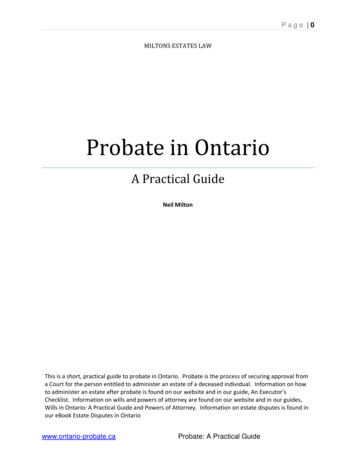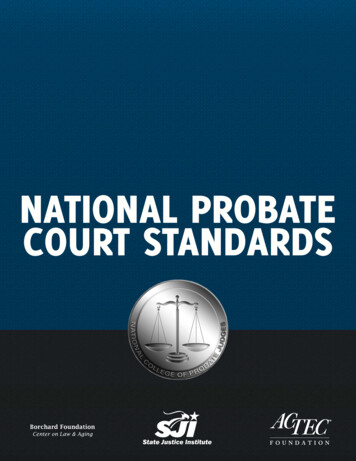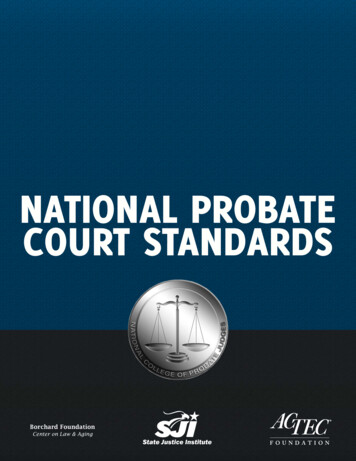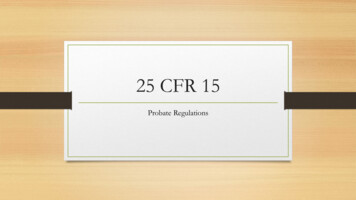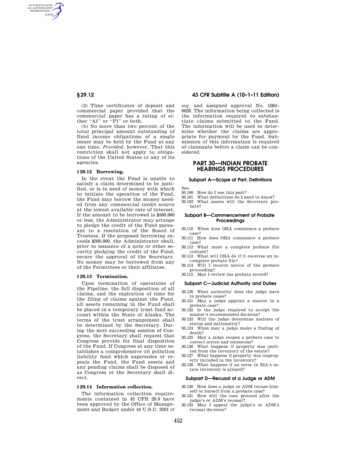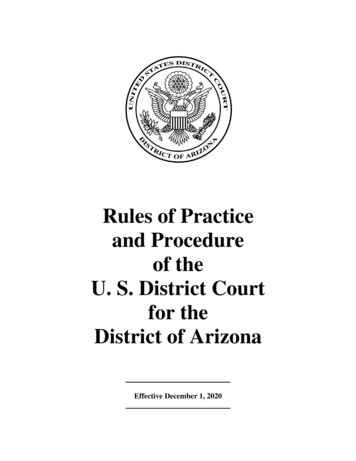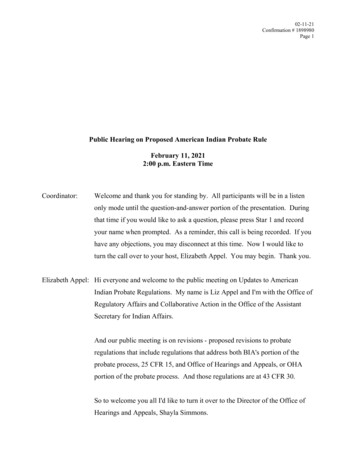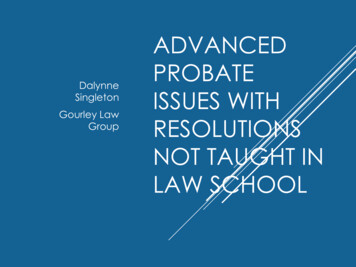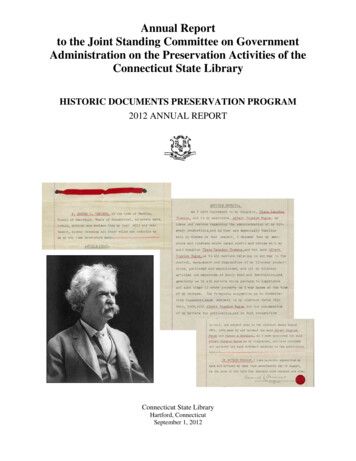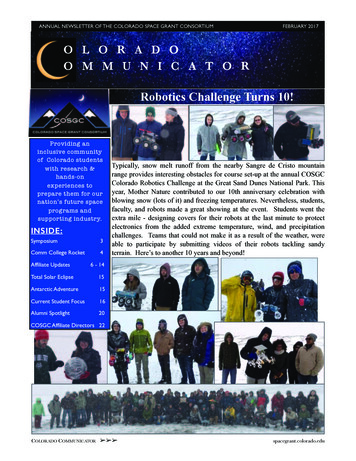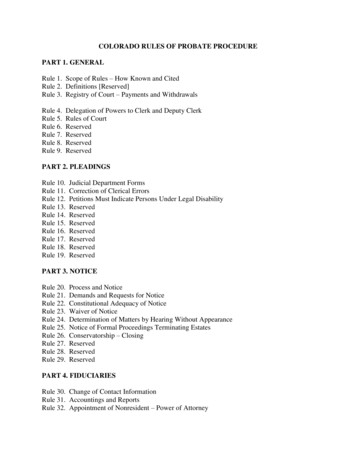
Transcription
COLORADO RULES OF PROBATE PROCEDUREPART 1. GENERALRule 1. Scope of Rules – How Known and CitedRule 2. Definitions [Reserved]Rule 3. Registry of Court – Payments and WithdrawalsRule 4.Rule 5.Rule 6.Rule 7.Rule 8.Rule 9.Delegation of Powers to Clerk and Deputy ClerkRules of CourtReservedReservedReservedReservedPART 2. PLEADINGSRule 10.Rule 11.Rule 12.Rule 13.Rule 14.Rule 15.Rule 16.Rule 17.Rule 18.Rule 19.Judicial Department FormsCorrection of Clerical ErrorsPetitions Must Indicate Persons Under Legal ReservedReservedPART 3. NOTICERule 20.Rule 21.Rule 22.Rule 23.Rule 24.Rule 25.Rule 26.Rule 27.Rule 28.Rule 29.Process and NoticeDemands and Requests for NoticeConstitutional Adequacy of NoticeWaiver of NoticeDetermination of Matters by Hearing Without AppearanceNotice of Formal Proceedings Terminating EstatesConservatorship – ClosingReservedReservedReservedPART 4. FIDUCIARIESRule 30. Change of Contact InformationRule 31. Accountings and ReportsRule 32. Appointment of Nonresident – Power of Attorney
Rule 33.Rule 34.Rule 35.Rule 36.Rule 37.Rule 38.Rule 39.Bond and rvedPART 5. CONTESTED PROCEEDINGSRule 40.Rule 41.Rule 42.Rule 43.Rule 44.Rule 45.Rule 46.Rule 47.Rule 48.Rule 49.DiscoveryJury Trial – Demand and WaiverObjections to Accounting, Final Settlement, Distribution or eservedReservedPART 6. DECEDENT’S ESTATESRule 50.Rule 51.Rule 52.Rule 53.Rule 54.Rule 55.Rule 56.Rule 57.Rule 58.Rule 59.Wills – Deposit for Safekeeping and WithdrawalsTransfer of Lodged WillsInformal Probate – Separate WritingsHeirs and Devisees – Unknown, Missing or Nonexistent – Notice to Attorney GeneralSupervised Administration – Scope of Supervision – Inventory and AccountingCourt Order Supporting Deed of DistributionForeign Personal RepresentativesReservedReservedReservedPART 7. PROTECTIVE PROCEEDINGSRule 60. Physicians’ Letters or Professional EvaluationRule 61. Financial Plan with Inventory and Motion for Approval – ConservatorshipsRule 62. Court Approval of Settlement of Claims of Persons Under DisabilityRule 63. Foreign ConservatorsRule 64. ReservedRule 65. ReservedRule 66. ReservedRule 67. ReservedRule 68. ReservedRule 69. Reserved
PART 8. TRUSTSRule 70.Rule 71.Rule 72.Rule 73.Rule 74.Rule 75.Rule 76.Rule 77.Rule 78.Rule 79.Trust Registration – Amendment, Release and servedReservedReservedReserved
PART 1. GENERALRule 1. Scope of Rules - How Known and Cited(a) Procedure Governed. These rules govern the procedure in the probate court for the city andcounty of Denver and district courts when sitting in probate. In case of conflict between theserules and the Colorado Rules of Civil Procedure (C.R.C.P.), or between these rules and any localrules of probate procedure, these rules will control.(b) How Known and Cited. These rules will be known and cited as the Colorado Rules ofProbate Procedure, or C.R.P.P.(c) In General. “Colorado Probate Code” means Articles 10 to 17 of Title 15 of the ColoradoRevised Statutes (C.R.S.). Except as otherwise provided, terms used in these rules are defined inthe applicable sections of Title 15, C.R.S., as amended.Rule 2. Definitions [Reserved]Rule 3. Registry of Court – Payments and WithdrawalsPayments into and withdrawals from the registry of the court must be made only upon order ofcourt.Rule 4. Delegation of Powers to Clerk and Deputy Clerk(a) The court by written order may, in addition to duties and powers exercised as registrar ininformal proceedings, delegate to the clerk or deputy clerk any one or more of the followingduties, powers and authorities to be exercised under the supervision of the court:(1) To appoint fiduciaries and to issue letters, if there is no written objection to theappointment or issuance on file;(2) To set a date for hearing on any matter and to vacate any such setting;(3) To issue dedimus to take testimony of a witness to a will;(4) To approve the bond of a fiduciary;(5) To appoint a guardian ad litem, subject to the provisions of law;(6) To certify copies of documents filed in the court;(7) To order a deposited will lodged in the records and to notify the named personalrepresentative;(8) To enter an order for service by mailing or by publication where such order is authorized
by law or by the Colorado Rules of Civil Procedure;(9) To correct any clerical error in documents filed in the court;(10) To appoint a special administrator in connection with the claim of a fiduciary;(11) To order a will transferred to another jurisdiction pursuant to Rule 51 herein;(12) To admit wills to formal probate and to determine heirship, if there is no objection tosuch admission or determination by any interested person;(13) To enter estate closing orders in formal proceedings, if there is no objection to entry ofsuch order by any interested person;(14) To issue a citation to appear to be examined regarding assets alleged to be concealed,etc., pursuant to § 15-12-723, C.R.S.;(15) To order an estate reopened for subsequent administration pursuant to § 15-12-1008,C.R.S.;(16) To enter other orders upon the stipulation of all interested persons.(b) All orders and proceedings by the clerk or deputy clerk under this rule must be made part ofthe permanent record.(c) Any person in interest affected by an order entered or action taken under the authority of thisrule may have the matter heard by the judge by filing a motion for such hearing within 14 daysafter the entering of the order or the taking of the action. Upon the filing of such a motion, theorder or action in question must be vacated and the motion placed on the calendar of the court foras early a hearing as possible, and the matter must then be heard by the judge. The judge may,within the same 14 day period referred to above, vacate the order or action on the court's ownmotion. If a motion for hearing by the judge is not filed within the 14 day period, or the order oraction is not vacated by the judge on the court's own motion within such period, the order oraction of the clerk or deputy clerk will be final as of its date subject to applicable rights ofappeal. The acts, records, orders, and judgments of the clerk or deputy clerk not vacated pursuantto the foregoing provision will have the same force, validity, and effect as if made by the judge.Rule 5. Rules of Court(a) Repeal of Local rules. All local probate rules are hereby repealed. Local rules may beenacted pursuant to C.R.C.P. 121(b).(b) Procedure not otherwise specified. If no procedure is specifically prescribed by rule orstatute, the court may proceed in any lawful manner not inconsistent with these rules of probateprocedure and the Colorado Probate Code and must look to the Colorado Rules of CivilProcedure and to the applicable law if no rule of probate procedure exists.
Rule 6. ReservedRule 7. ReservedRule 8. ReservedRule 9. Reserved
PART 2. PLEADINGSRule 10. Judicial Department FormsThe Judicial Department Forms (JDF) approved by the Supreme Court should be used whereapplicable. Any pleading, document, or form filed in a probate proceeding should, insofar aspossible, substantially follow the format and content of the approved JDF, if applicable.Rule 11. Correction of Clerical Errors(a) Documents with clerical errors filed with the court may be made the subject of a writtenrequest for correction by filing JDF 740 or a document that substantially follows the format andcontent of the approved JDF, if applicable, and may file a corrected document.(b) A clerical error may include, but is not limited to:(1) Errors in captions;(2) Misspellings;(3) Errors in dates, other than dates for settings, hearings, and limitations periods; or(4) Transposition errors.(c) A clerical error does not include the addition of an argument, allegation, or fact that has legalsignificance. If the court is not satisfied that a written request for correction is a clerical error, therequest may be denied.Rule 12. Petitions Must Indicate Persons Under Legal Disability(a) Petition Requirements and Notice. If a person under legal disability has any interest in thesubject matter of a petition which requires the issuance of notice, the petition must state:(1) That an interested person is under legal disability as defined in subsection (b) below;(2) The name, age, and residence of the person under legal disability; and(3) The name of the guardian, conservator, or personal representative, if any.(b) Legal Disability. A person under legal disability includes, but is not limited to, a person whois:(1) Under 18 years of age; or(2) Incompetent or incapacitated to such an extent that the individual is incapable ofadequately representing his or her own interest.
Rule 13.Rule 14.Rule 15.Rule 16.Rule 17.Rule 18.Rule dReserved
PART 3. NOTICERule 20. Process and NoticeThe issuance, service, and proof of service of any process, notice, or order of court under theColorado Probate Code will be governed by the provisions of the Colorado Probate Code andthese rules. When no provision of the Colorado Probate Code or these rules is applicable, theColorado Rules of Civil Procedure will govern. Except when otherwise ordered by the court inany specific case or when service is by publication, if notice of a hearing on any petition or otherpleading is required, the petition or other pleading, unless previously served, must be served withthe notice. When served by publication, the notice must briefly state the nature of the reliefrequested. The petition or other pleading need not be attached to or filed with the proof ofservice, waiver of notice, or waiver of service.Rule 21. Demands and Requests for Notice(a) Demands for Notice. Demands for notice in decedents’ estates are governed by § 15-12-204,C.R.S. After a demand for notice has been filed with the court, the clerk or registrar maythereafter take any authorized action, including, accepting and acting upon an application forinformal appointment of a personal representative.(b) Requests for Notice. Requests for Notice in Protective Proceedings are governed by § 1514-116, C.R.S.Rule 22. Constitutional Adequacy of NoticeWhen statutory notice is deemed by the court to be constitutionally inadequate, the court mustprovide on a case-by-case basis for such notice as will meet constitutional requirements.Rule 23. Waiver of NoticeUnless otherwise approved by the court, a waiver of notice where authorized must identify thenature of the hearings or other matters to which the waiver of notice applies.Rule 24. Determination of Matters by Hearing Without Appearance(a) A hearing without appearance is a setting before or with the court for a ruling without theappearance of the parties.(b) Unless otherwise required by statute, these rules, or court order, any appropriate matter maybe set for a hearing without appearance.(c)The procedure governing a hearing without appearance is as follows:(1) Attendance at the hearing without appearance is not required or expected.(2) Any interested person wishing to object to the requested action set forth in the court filing
attached to the notice must file a specific written objection with the court at or before thehearing, and must serve a copy of the objection on the person requesting the court order andall persons listed on the notice of hearing without appearance. Form JDF 722, or a form thatsubstantially conforms to JDF 722, may be used and will be sufficient.(3) If no objection is filed, the court may take action on the matter without further notice orhearing.(4) If any objection is filed, the objecting party must, within 14 days after filing theobjection, contact the court to set the objection for an appearance hearing. If a hearing isscheduled, the objecting party must file a notice of hearing, and serve a copy on all personslisted on the notice of hearing without appearance. Failure to timely set the objection for anappearance hearing as required will result in action by the court as set forth in subsection (d).(d) Upon the filing of an objection, the court may, in its discretion:(1) Rule upon the written filings and briefs submitted;(2) Require oral argument;(3) Require an evidentiary hearing;(4) Order the petitioner, movant, objector, and any other interested person who has enteredan appearance to participate in alternative dispute resolution; or(5) Enter any other orders the court deems appropriate.(e) The Notice of a Hearing Without Appearance, together with copies of the court filing andproposed order must be served on all interested persons no less than 14 days prior to thesetting of the hearing and must include a clear statement of this rule governing a hearingwithout appearance. Form JDF 712 or JDF 963, or a form that substantially conforms to suchforms, may be used and will be sufficient.COMMENTS2018[1] Before the 2018 amendments, the rule was titled “Non-Appearance Hearings,” whichengendered confusion for practitioners and self-represented parties as it referred to a hearing,which denotes an appearance, and then directed the party not to appear before the court. As apart of the 2018 amendments, the title of the rule changed to “Determination of Matters byHearing Without Appearance” that more appropriately describes the actual practice; the rule isuseful for matters required by statute to have a hearing when a party appearance is not requiredor mandated.
[2] The pre-2018 rule directed that matters which are “routine and unopposed” may be scheduledfor hearing without appearance, however, there was no definition contained within the rule forwhat matters are considered to be “routine and unopposed.” With the 2018 amendments,language defining a hearing without appearance was added in subsection (a), and languagegenerally describing what may be set on the docket in subsection (b). Motions for summaryjudgment and motions to dismiss are not appropriate for placement on a docket for hearingwithout appearance, and these motions should be filed using the procedure set forth in C.R.C.P.121§ 1-15.[3] The rule does not contain a requirement that the court rule on a motion on the date scheduledfor hearing without an appearance. There is confusion among practitioners and self-representedparties regarding when the court is required to rule on a matter scheduled under this rule; thecourt may rule on these matters in due course after the date for hearing without appearance haspassed. This rule allows for expediting many matters before the probate court while specifyingthat matters may be determined by the probate court without an appearance hearing, such asaccommodating a real estate closing or other deadline such as a move-in date for a party.[4] Matters denoted as requiring immediate action should not be scheduled for hearing withoutappearance.[5] Concerns were raised regarding the shortened time frame in subsection (c)(4) for ruling onmotions contained within the rule and whether the failure of a party or counsel to respond withinthese time frames would unfairly prejudice a party. Practitioners should bear in mind their ethicalobligations to opposing parties and counsel when choosing to schedule a motion that may beopposed on the docket for hearing without appearance. Scheduling a motion on the docket forhearing without an appearance for determination on the merits where no responsive pleading hasbeen filed with the court increases judicial economy by placing an opposing party or counsel onnotice that a ruling may be entered unless a responsive pleading is filed with the court.Rule 25. Notice of Formal Proceedings Terminating EstatesThe notice of hearing on a petition under § 15-12-1001 or § 15-12-1002, C.R.S., must includestatements:(a) That interested persons have the responsibility to protect their own rights and interests withinthe time and in the manner provided by the Colorado Probate Code, including theappropriateness of claims paid, the compensation of personal representatives, attorneys, andothers, and the distribution of estate assets, because the court will not review or adjudicate theseor other matters unless specifically requested to do so by an interested person; and(b) That if any interested person desires to object to any matter such person must file specificwritten objections at or before the hearing and must serve the personal representative with a copypursuant to C.R.C.P. 5.
Rule 26. Conservatorship – ClosingNotice of the hearing on a petition for termination of conservatorship must be served on theprotected person, if then living, and all other interested persons, as defined by law or by the courtpursuant to § 15-10-201(27), C.R.S., if any. Such hearing may be held pursuant to Rule 24.Rule 27. ReservedRule 28. ReservedRule 29. Reserved
PART 4. FIDUCIARIESRule 30. Change of Contact Information(a) Every fiduciary must promptly notify the court of any change to the name, physical ormailing address, e-mail address, or telephone number of:(1) The fiduciary; or(2) The ward or protected person.(b) Notice to the court will be accomplished by filing the appropriate JDF or a form thatsubstantially conforms to the JDF.Rule 31. Accountings and Reports(a) A fiduciary accounting or report must contain sufficient information to put interested personson notice as to all significant transactions affecting administration during the accounting period.(b) An accounting or report prepared by a personal representative, conservator, guardian,trustee, or other fiduciary must show with reasonable detail:(1) The receipts and disbursements for the period covered by the accounting or report;(2) The assets remaining at the end of the period; and(3) All other transactions affecting administration during the accounting or report period.(c) Accountings and reports that substantially conform to JDF 942 for decedents' estates, JDF885 for conservatorships, JDF 834 for minor guardianships, and JDF 850 for adult guardianshipswill be considered acceptable as to both content and format for purposes of this rule. All otherfiduciary accountings and reports must comply with the requirements of subsection (b).(d) The court may require the fiduciary to produce supporting evidence for any and alltransactions.Rule 32. Appointment of Nonresident – Power of AttorneyAny person, resident or nonresident of this state, who is qualified to act under the ColoradoProbate Code may be appointed as a fiduciary. When appointment is made of a nonresident, theperson appointed must file an irrevocable power of attorney designating the clerk of the courtand the clerk’s successors in office, as the person upon whom all notices and process issued by acourt or tribunal in the state of Colorado may be served, with like effect as personal service onsuch fiduciary, in relation to any suit, matter, cause, hearing, or thing, affecting or pertaining tothe proceeding in regard to which the fiduciary was appointed. The power of attorney requiredby the provisions of this rule must set forth the address of the nonresident fiduciary. The clerk
must promptly forward, by certified, registered, or ordinary first-class mail any notice or processserved upon him or her, to the fiduciary at the address last provided in writing to the clerk. Theclerk must file a certificate of service. Such service will be deemed complete 14 days aftermailing. The clerk may require the person issuing or serving such notice or process to furnishsufficient copies, and the person desiring service must advance the costs and mailing expenses ofthe clerk.Rule 33. Bond and SuretyA fiduciary must file any required bond, or complete other arrangements for security beforeletters are issued. If there is a substantial deviation in the value of assets under protection oradministration the fiduciary must petition the court for a review of the bond.Rule 34.Rule 35.Rule 36.Rule 37.Rule 38.Rule d
PART 5. CONTESTED PROCEEDINGSRule 40. Discovery(a) This rule establishes the provisions and structure for discovery in all proceedings seekingrelief under Title 15, C.R.S. Nothing in this rule will alter the court’s authority and ability todirect proportional limitations on discovery or to impose a case management structure or enterother discovery orders. Upon appropriate motion or sua sponte, the court may apply theColorado Rules of Civil Procedure in whole or in part, may fashion discovery rules applicable tospecific proceedings, and may apply different discovery rules to different parts of theproceeding.(b) Unless otherwise ordered by the court, the parties may engage in the discovery provided byC.R.C.P. 27 through 36. Any discovery conducted in Title 15 proceedings prior to the issuanceof a case management or other discovery order will be subject to C.R.C.P. 26(a)(2)(A), 26(a)(2)(B), 26(a)(4) and (5), and 26(b) through (g). However, due to the unique, expedited and oftenexigent circumstances in which probate proceedings take place, C.R.C.P. 16, 16.1, 16.2, and26(a)(1) do not apply to probate proceedings unless ordered by the court or stipulated to by theparties.(c) C.R.C.P. 37, 45, and 121 § 1-12 are applicable to proceedings under Title 15.(d) Notwithstanding subsections (a) through (c) of this rule, subpoenas and discovery directed toa respondent in proceedings under Title 15, Article 14, Part 3, must not be permitted withoutleave of court, or until a petition for appointment of a guardian has been granted under § 15-14311, C.R.S.Rule 41. Jury Trial – Demand and WaiverIf a jury trial is permitted by law, any jury demand must be filed with the court, and the requisitefee paid, before the matter is first set for trial. The demanding party must pay the requisite juryfee upon the filing of the demand. Failure of a party to file and serve a demand for jury trial andpay the requisite fee as provided in this rule will constitute a waiver of trial by jury as providedin C.R.C.P. 38(e).Rule 42. Objections to Accounting, Final Settlement, Distribution or Discharge(a) If any interested person desires to object to any accounting, the final settlement ordistribution of an estate, the discharge of a fiduciary, or any other matter, the interested personmust file specific written objections at or before the hearing thereon, and shall serve all interestedpersons with copies of the objections.(b) If the matter is uncontested and set for a hearing without appearance, any interested personwishing to object must file specific written objections with the court at or before the hearing, andmust serve all interested persons with copies of the specific written objections. An objectormust set an appearance hearing in accordance with Rule 24.
(c) If the matter is set for an appearance hearing, the objector must file specific writtenobjections 14 or more days before the scheduled hearing. If the objector fails to provide copiesof the specific written objections within the required time frame, the petitioner is entitled to acontinuance of the hearing.Rule 43.Rule 44.Rule 45.Rule 46.Rule 47.Rule 48.Rule dReserved
PART 6. DECEDENT’S ESTATESRule 50. Wills – Deposit for Safekeeping and WithdrawalsA will of a living person tendered to the court for safekeeping in accordance with § 15-11-515,C.R.S., must be placed in a “Deposited Will File” and a certificate of deposit issued. In thetestator's lifetime, the deposited will may be withdrawn only in strict accordance with § 15-11515, C.R.S. After the testator's death, a deposited will must be transferred to the “Lodged WillFile.”Rule 51. Transfer of Lodged WillsIf a petition under § 15-11-516, C.R.S., to transfer a will is filed and if the requested transfer is toa court within this state, no notice need be given; if the requested transfer is to a court outsidethis state, notice must be given to the person nominated as personal representative and such otherpersons as the court may direct. No filing fee will be charged for this petition, but the petitionermust pay any other costs of transferring the original will to the proper court.Rule 52. Informal Probate – Separate WritingsThe existence of one or more separate written statements disposing of tangible personal propertyunder the provisions of § 15-11-513, C.R.S., will not cause informal probate to be declined underthe provisions of § 15-12-304, C.R.S.Rule 53. Heirs and Devisees – Unknown, Missing or Nonexistent – Notice to Attorney GeneralIn a decedent's estate, whenever it appears that there is an unknown heir or devisee, or that theaddress of any heir or devisee is unknown, or that there is no person qualified to receive a deviseor distributive share from the estate, the personal representative must promptly notify theattorney general. Thereafter, the attorney general must be given the same information and noticerequired to be given to persons qualified to receive a devise or distributive share. When makingany payment to the state treasurer of any devise or distributive share, the personal representativemust include a copy of the court order obtained under § 15-12-914, C.R.S.Rule 54. Supervised Administration – Scope of Supervision – Inventory and Accounting(a) In considering the scope of supervised administration under § 15-12-501, C.R.S., the courtmust order such supervision as deemed necessary, after considering the reasons for the request.(b) If supervised administration is ordered, the personal representative must file with the courtand serve interested persons:(1) An inventory;(2) Annual interim accountings;
(3) A final accounting; and(4) Other documentation as ordered by the court.Rule 55. Court Order Supporting Deed of DistributionWhen a court order is requested to vest title in a distributee free from the rights of other personsinterested in the estate, such order must not be granted ex parte, but must require either thestipulation of all interested persons or notice and hearing, initiated by the requesting party.COMMENT2018Note that Colorado Bar Association Real Estate Title Standard 11.1.7 discusses certainrequirements for the vesting of merchantable title in a distributee. A court order is necessary tovest merchantable title in a distributee, free from the rights of all persons interested in the estate torecover the property in case of an improper distribution. This rule requires a notice and hearingprocedure as a condition of issuance of such order. A certified copy of the court’s order should berecorded with the deed of distribution. Under the title standard, an order is not required to vestmerchantable title in a purchaser for value from or a lender to such distributee. See § 38-35-109,C.R.S.Rule 56. Foreign Personal Representatives(a) After the death of a nonresident decedent, copies of the documents evidencing appointmentof a domiciliary foreign personal representative may be filed as provided in § 15-13-204, C.R.S.Such documents must have been certified, exemplified or authenticated by the appointing foreigncourt not more than 60 days prior to filing with a Colorado court, and must include copies of allof the following that may have been issued by the foreign court:(1) The order appointing the domiciliary foreign personal representative, and(2) The letters or other documents evidencing or affecting the domiciliary foreign personalrepresentative's authority to act.(b) Upon filing such documents and a sworn statement by the domiciliary foreign personalrepresentative stating that no administration, or application or petition for administration, ispending in Colorado, the court must issue a Certificate of Ancillary Filing, attesting that the clerkhas in his or her possession the documents referenced in subsection (a) of this rule.Rule 57. ReservedRule 58. ReservedRule 59. Reserved
PART 7. PROTECTIVE PROCEEDINGSRule 60. Physicians' Letters or Professional EvaluationAny physician's letter or professional evaluation utilized as the evidentiary basis to support apetition for the appointment of a guardian, conservator or other protective order under Article 14of the Colorado Probate Code, unless otherwise directed by the court, should contain:(a) A description of the nature, type, and extent of the respondent's specific cognitive andfunctional limitations, if any;(b) An evaluation of the respondent's mental and physical condition and, if appropriate,educational potential, adaptive behavior, and social skills;(c) A prognosis for improvement and recommendation as to the appropriate treatment orrehabilitation plan; and(d) The date of any assessment or examination upon which the report is based.Rule 61. Financial Plan with Inventory and Motion for Approval – ConservatorshipsA Conservator’s Financial Plan with Inventory and Motion for Approval must be filed with thecourt and served on all interested persons. The request for approval of the plan may be set on thehearing without appearance docket, the appearance docket, or not set for hearing and treated as amotion under C.R.C.P. 121.Rule 62. Court Approval of Settlement of Claims of Persons Under Disability(a) This rule sets forth procedures by which a court considers requests for approval of the proposedsettlement of claims on behalf of a minor or an adult in need of protection pursuant to§ 15-14-401,et seq., C.R.S., (“respondent”). In connection with a proceeding brought under this rule, the courtmust:(1) Consider the reasonableness of the proposed settlement and enter appropriate orders as thecourt finds will serve the best interest of the respondent;(2) Ensure that the adult respondent, a minor respondent’s parent, an adult respondent’s orminor respondent’s legal guardian, conservator, other fiduciary, next friend, guardian ad litem,and other interested persons as the court deems proper, have been advised of the finality ofth
Rule 50. Wills - Deposit for Safekeeping and Withdrawals Rule 51. Transfer of Lodged Wills Rule 52. Informal Probate - Separate Writings Rule 53. Heirs and Devisees - Unknown, Missing or Nonexistent - Notice to Attorney General Rule 54. Supervised Administration - Scope of Supervision - Inventory and Accounting Rule 55.

